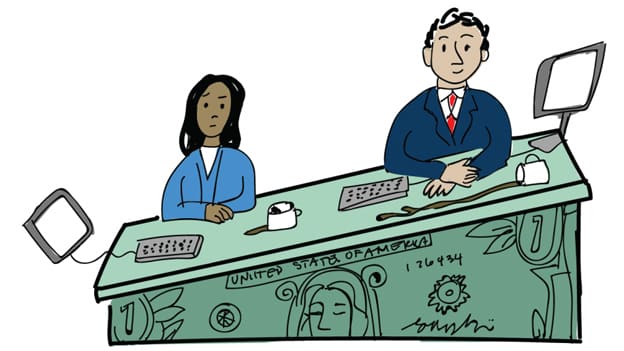MEGAN THOMPSON: The past year has surfaced countless tales of workplace harassment. But there's a correlation between these events and gender inequalities that have long existed in a working world. The findings are part of the fourth annual Women in the Workplace survey of more than 64,000 workers across nearly 300 companies. The Wall Street Journal has been publishing a series of reports about women, men and work. Editor Lynn Cook joined NewsHour Weekend's Hari Srinivasan to discuss.
HARI SREENIVASAN: One of the things that struck out from the survey was more than a third of women reported that they had been harassed at some point in their careers. Now this is a survey that goes out probably, mostly to white collar workers, so this might be underreported? That's a staggering number!
LYNN COOK: It's a staggering number and you're right because this survey was, companies that participated, care about this issue and it tended to be more white collar workers than a lot of say hotel or retail or restaurant workers that we already know experience harassment at greater rates. But even among those mostly white collar workers at big companies that tend to take gender diversity seriously, 35 percent said they were harassed.
HARI SREENIVASAN: This is the fourth year that the survey is coming out. What's different now in sort of in the post MeToo climate?

LYNN COOK: Well this is the first year they've actually surveyed sexual harassment. They've asked those questions. And so what was shocking is that not only are a third of women experiencing harassment but if you're a woman in a male-dominated role like a technical role, it's even more, it's 45 percent of those women say they've been harassed. In senior leadership, like women in executive roles, 55 percent said they have been harassed. There's a company called Conversant that runs these hotlines where people can call in their complaints and the calls jumped by 72 percent in this last year. So there was a huge uptick.
HARI SREENIVASAN: One of the survey questions you asked, needing to provide more evidence of my competence than others do, 44 percent of women said yes, only 13 percent of men said yes.
LYNN COOK: Right.
HARI SREENIVASAN: It's regardless of how qualified they are. They have to do more.
LYNN COOK: That's the feeling that come, that's at least with this data showing that you know, sexual harassment aside, there are other kinds of discrimination that women are constantly struggling against. It's maybe more subtle and a lot of it might be, you know, unintended. But women often get mistaken for more junior people. They feel they have to say, you know, really fight to be heard in meetings. They're frequently feeling like they have to
HARI SREENIVASAN: Especially if they're one of the fewer women that are these meetings where the decision to be made?
LYNN COOK: Right. That's another, that's another piece of the data that was really interesting this year. This idea that if you're the only one in the room, the only one on your team, the only one in your building, in some cases for like, black women especially, you experience work in a very negative way. And it might not be outright harassment, but again, these more subtle forms of discrimination. So when you're the only one in the room, those women said they were less likely to even stay at a job. They actually think a lot more about leaving. So companies in the survey, you know, were kind of surprised to hear that because for all the talk about recruiting, getting more people of color, more women in the doors, actually retaining them and getting them to stay, is a whole different equation.
HARI SREENIVASAN: And there's also a, almost a men are from Mars, women are from Venus perception of how this state of work is playing out.
One of the things, "My gender played a role in missing out on a raise, promotion or a chance to get ahead." Only eight percent of men suggested that and 24 percent of women said yes to that.
LYNN COOK: There's a huge disparity. It's like there's two different workplaces going on in the same workplace where men frequently feel like things are fine and women feel like they're not fine.
HARI SREENIVASAN: It's a fascinating survey and there are several stories in The Wall Street Journal about this. Lynne Cook thanks for joining us.
LYNN COOK: Thank you.












